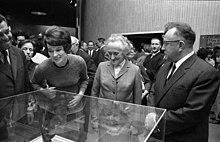KLK to PTX - The Red Chapel
KLK an PTX - Die Rote Kapelle is a feature film made in 1970 by the DEFA working group “Berlin”. The film deals with the resistance group against National Socialism around Harro Schulze-Boysen and Arvid Harnack, known as the Rote Kapelle . Directed by Horst E. Brandt , the screenplay comes from Wera and Claus Küchenmeister . The premiere took place on March 25, 1971 in the Berlin premiere cinema Kosmos .
action
After Adolf Hitler came to power, a resistance group formed in Berlin whose members came from very different classes and social strata: In addition to the lawyer and economist Arvid Harnack , it also included the officer Harro Schulze-Boysen , the writer Adam Kuckhoff , the communist and editor of the KPD Newspaper Die Rote Fahne , John Sieg , and the worker Kurt “Papa” Schulze . Together they collect information and transmit it to France , Great Britain and Belgium , the USA and the USSR . Kurt Schulze trains the young lathe operator Hans Coppi as the group's radio operator.
After Germany's attack on the Soviet Union , the work of the resistance group intensified. The counterintelligence and the Gestapo track down the group. Schulze-Boysen was arrested at the end of August 1942; Many more arrests follow in the next few days and weeks.
background
KLK an PTX was the first cinematic treatment of the Red Chapel's resistance activities ; a year later followed in the Federal Republic of the ARD series Die Rote Kapelle , which focused on the resistance in Belgium and France. KLK at PTX was a novelty for DEFA's filmic examination of the resistance in the Third Reich, in which the communist resistance had been in the foreground up to now , as a broad alliance of resistance fighters of different ideologies was traced here.

The preparatory work for the film began in mid-1966 with several preliminary talks between the scriptwriters Wera and Claus Küchenmeister and the agitation department of the Ministry for State Security . The master chefs had originally planned a documentary. For their film project, they were guaranteed the greatest possible state support; Among other things, the MfS supplied extensive documentary material (such as interrogation and execution records) on the Red Chapel , which had been collected in the MfS main department IX / 11 (investigation of Nazi and war crimes). It was only in the course of the material research that the idea of implementing the project as a feature film developed.
The project was also close to the hearts of the authors for personal reasons: The journalist and resistance fighter Walter Küchenmeister , embodied in the film by Harry Pietzsch and father of the screenwriter Claus Küchenmeister, was a member of the Red Orchestra and was executed by the Nazis in 1943.
The detailed, three-hour fictional film was shot on 70 mm (in DEFA-70 film format ) partly at the original locations; the production costs amounted to 6.6 million GDR marks .
Awards
The film received the rating “particularly valuable”.
On June 6, 1971 the film collective (authors Wera and Claus Küchenmeister, director Horst E. Brandt, cameraman Günter Haubold, dramaturge Anne Pfeuffer and the actors Horst Drinda, Irma Münch, Klaus Piontek, Jutta Wachowiak, Horst Schulze, Barbara Adolph, Manfred Karge, Ursula Karusseit, Eberhard Esche, Harry Pietzsch and Günther Simon) the FDGB Art Prize .
When the GDR national prizes were awarded on October 4, 1971, the film's creators' collective (director Horst E. Brandt, cameraman Günter Haubold and screenwriters Wera and Claus Küchenmeister) received the first class national prize. The only other film collective that won the National First Class Award this year were the creators of the film Goya - or the dire path of knowledge around director Konrad Wolf .
Also on October 4, 1971, the actors Horst Drinda, Irma Münch and Klaus Piontek received the GDR Art Prize .
The film was shown in October 1971 at the GDR Film Week in Moscow , in November 1971 at the DEFA Film Festival in Kiev and in April 1972 at the GDR Film Days in Stockholm .
Individual evidence
- ↑ Johannes Tuchel: The forgotten resistance: On real history and perception of the struggle against the Nazi dictatorship . Wallstein Verlag, Göttingen 2005, ISBN 3-89244-943-0 , p. 263 f. ( GBS )
- ↑ At the end of 1966 these 28 volumes of files were handed over to the Institute for Marxism-Leninism at the Central Committee of the SED and were then also available to broader research circles.